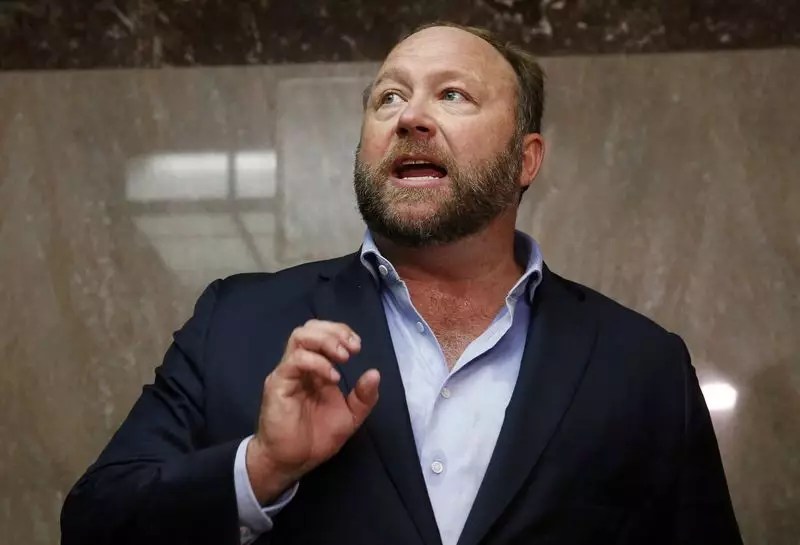In a striking courtroom development, a U.S. bankruptcy judge recently halted the proposed acquisition of Alex Jones’ notorious Infowars website by the satirical news outlet, The Onion. This ruling, which underscores the complexities of bankruptcy auctions and the scrutiny involved in evaluating bids for controversial assets, could significantly impact not only the involved parties but also the broader conversation regarding accountability for harmful misinformation.
U.S. Bankruptcy Judge Christopher Lopez presided over the proceedings, which unfolded in Houston over two tense days. The primary argument presented by Jones and his associated company, First American United Companies, revolved around allegations of collusion that purportedly tainted the bidding process. Jones contended that The Onion’s offer held an unfair advantage due to its backing from families who had won substantial legal verdicts against him for defamation. These families, still grappling with the aftermath of the Sandy Hook Elementary School tragedy, played an essential role in the legal actions that led to Jones’ financial insolvency.
Judge Lopez, however, rejected the claim of collusion. Instead, he focused on the conduct of the bankruptcy trustee, who oversaw the auction as a central point of contention. Lopez identified a “good-faith error” on the part of the trustee, who prematurely transitioned the process from preliminary bids to final offers rather than facilitating further competitive bidding. His assertion that the potential for additional revenue was “left on the table” suggests not only mismanagement but also a missed opportunity to recover more for the creditors involved in these proceedings.
At the heart of this case lies a staggering financial obligation. Jones, infamous for leveraging conspiracy theories to attract audiences and generate revenue, was forced to declare bankruptcy in 2022. The court found him liable for over $1.3 billion in damages stemming from defamation claims made by families affected by the Sandy Hook massacre. This amount represents one of the largest financial repercussions for public figure defamation in recent history, framing Jones as both a controversial media figure and a cautionary tale regarding the propagation of misinformation.
Judicial evaluation of bid offers during the auction revealed the inadequacy of both proposals, including The Onion’s bid of $3.5 million and that from First American United Companies, which was similarly valued. Lopez underscored the necessity for the bankruptcy trustee to resolve existing disputes among creditors before initiating another attempt to sell Infowars. Thus, the judge’s ruling served not only as a setback for The Onion but as a reaffirmation of the need for thorough financial management in the realm of bankruptcy proceedings.
The Onion emerged as the unexpected front-runner in a bidding war few anticipated. Along with their bid, they proposed to transform Infowars into a parody site that would reduce the propagation of harmful disinformation, branding their future endeavors with the tagline of creating a “better, funnier internet.” This vision highlights the intent to shift the narrative surrounding Infowars, aiming to dismantle its prior influence and notorious reputation.
On the flip side, disappointment reverberated through The Onion’s leadership following the ruling. CEO Ben Collins expressed frustration but affirmed the company’s ongoing interest in acquiring Infowars. This ambition, coupled with external pressure from stakeholders, paints a picture of a company committed to civic responsibility, even as it grapples with the logistical hurdles posed by the bankruptcy process.
Ultimately, the ruling serves as a poignant reminder of the repercussions that misinformation can unleash upon society. As families of the Sandy Hook victims continue to seek justice and accountability from Jones, the judicial system’s handling of financial accountability and asset liquidation remains under a microscope. The decision rendered by Judge Lopez not only delays immediate outcomes for creditors but illustrates the complexities inherent in dealing with a public figure embroiled in both financial and moral bankruptcy.
This case, emblematic of the entangled nature of media influence and legal accountability, will likely have ramifications that extend beyond the courtroom, prompting ongoing discussions of the role of misinformation in society and the necessary mechanisms for its redress. The implications of this auction fiasco could resonate through public discourse for years to come, marking a critical juncture in the intersection of media, law, and accountability.


Leave a Reply